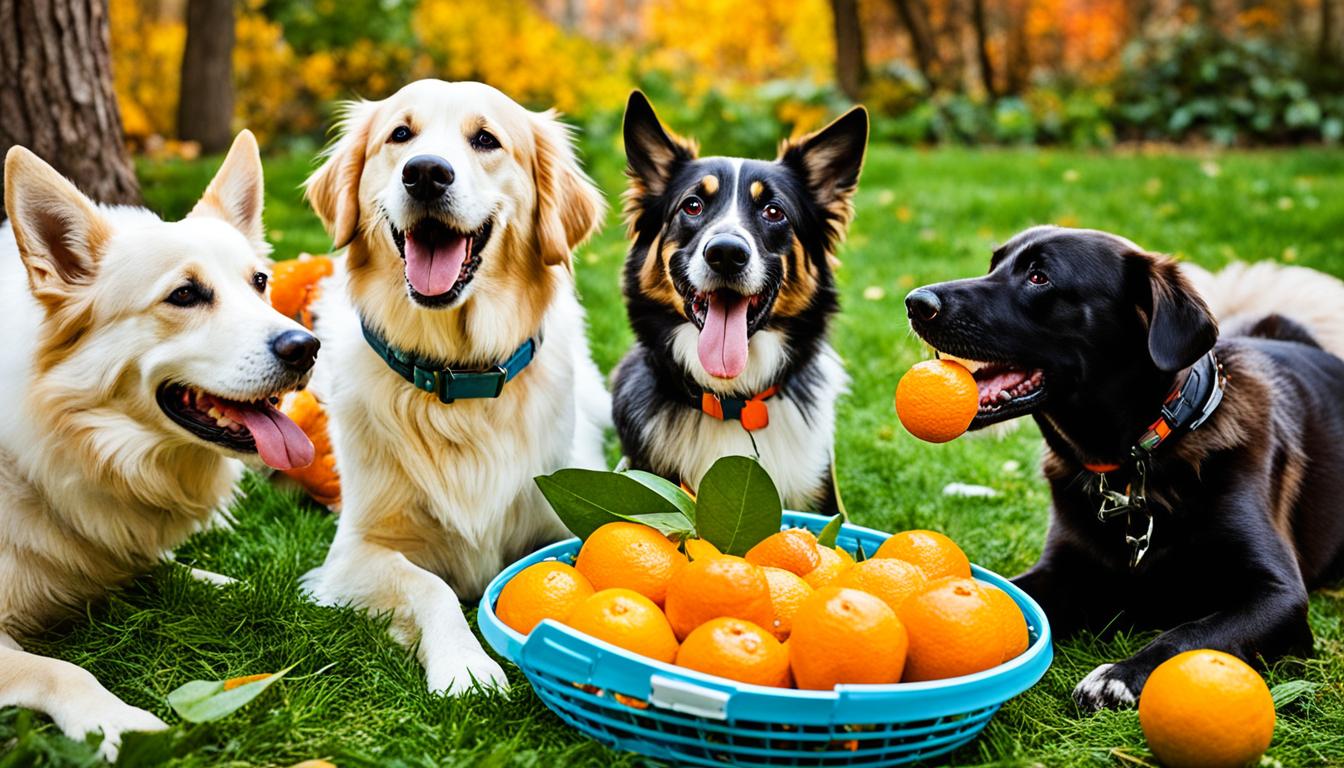As an Amazon Associate I earn from qualifying purchases.
Picture this: it’s a warm, sunny day, and you’re sitting outside enjoying a juicy, refreshing orange. The sweet citrus aroma fills the air, and as you take a bite, your taste buds come alive with tangy delight. Suddenly, your furry friend approaches, their adorable eyes fixed on your hand, hoping for a delicious treat. You can’t help but wonder, can dogs have oranges too?
Well, the good news is that dogs can enjoy the fleshy part of oranges, just like us. Oranges are safe for dogs to consume in moderation, and they even offer some nutritional benefits. But before you share this zesty delight with your canine companion, there are a few things you should know to keep them safe and healthy.
Key Takeaways:
- Dogs can eat oranges in small quantities.
- Oranges are rich in vitamin C, potassium, and fiber.
- Dogs with certain health conditions should avoid oranges.
- Orange peels, seeds, and juice are not safe for dogs.
- Consult with a veterinarian for appropriate portion sizes for your dog.
Nutritional Benefits of Oranges for Dogs
Oranges offer several nutritional benefits that can greatly enhance your dog’s well-being. When incorporated into their diet in the right amounts, oranges provide a range of essential nutrients that support their overall health.
Vitamin C: Oranges are an excellent source of vitamin C, which plays a crucial role in boosting your dog’s immune system. This essential nutrient helps protect your furry friend from illnesses and infections, keeping them healthy and energetic.
Potassium: Dogs require potassium for proper kidney function and optimal muscle health. Oranges contain potassium, ensuring that your dog’s body functions effectively and maintains muscle strength.
Fiber: The fiber content in oranges promotes good digestive health for your dog. It aids in regulating their bowel movements, preventing constipation, and supporting a healthy gastrointestinal system.
Incorporating oranges into your dog’s diet can provide these essential nutrients, contributing to a balanced and nutritious meal plan. However, keep in mind that moderation is key, as too much of a good thing can have adverse effects on your furry companion’s health.
“Oranges offer a natural and delicious way to introduce vital nutrients into your dog’s diet. With their high vitamin C and potassium content, as well as fiber, they can support your dog’s immune system, muscle health, and digestion.”
To give you a better perspective, let’s take a closer look at the specific benefits your dog can gain from consuming oranges:
| Benefits of Oranges for Dogs | Key Nutrients |
|---|---|
| Boosts immune system | Vitamin C |
| Supports kidney function | Potassium |
| Promotes healthy digestion | Fiber |
As you can see, oranges provide dogs with a range of benefits that can positively impact their health. However, it’s important to note that each dog is unique, and their dietary needs may vary. Always consult with your veterinarian to determine the appropriate portion size and ensure your dog’s overall diet remains balanced and suitable for their specific needs.
Potential Risks of Feeding Oranges to Dogs
While oranges are generally safe for dogs, it’s essential to be aware of the potential risks involved. Dogs are loyal companions, and their well-being is a top priority. Here are some hazards to consider when it comes to feeding oranges to your furry friend:
- Risks of Feeding Oranges to Dogs:
- Sugar Content: Oranges contain natural sugars, which can lead to weight gain and upset stomachs if consumed in excess. It’s important to remember that moderation is key when offering oranges to your four-legged companion.
- Citrus Acid: Oranges have a high citrus acid content, which can potentially cause digestive issues in dogs, such as diarrhea or vomiting. While this is rare, it’s important to monitor your dog’s reaction when introducing oranges into their diet.
- Orange Peels: Orange peels should be avoided when feeding dogs oranges. Not only can they cause digestive blockages, but they may also contain toxic compounds that can be harmful to your pet.
- Orange Seeds: Be mindful of orange seeds as they can cause digestive blockages as well. Ensure that all seeds are removed before offering any part of an orange to your furry friend.
Dogs with certain health conditions, like diabetes, should not consume oranges due to their sugar content. Always consult with your veterinarian before introducing any new food to your dog’s diet.
“Remember, the well-being of your furry friend comes first. Just like with any food, it’s crucial to consider potential risks and consult with a veterinarian when in doubt.”

| Risks of Feeding Oranges to Dogs | Precautions to Take |
|---|---|
| Sugar content can contribute to weight gain and upset stomachs if consumed in excess. | Offer oranges in moderation and consider your dog’s overall calorie intake. |
| High citrus acid content may cause digestive issues such as diarrhea or vomiting. | Observe your dog’s reaction to oranges and limit their consumption if any adverse effects occur. |
| Orange peels can cause digestive blockages and might contain toxic compounds. | Avoid giving your dog orange peels and ensure all seeds are removed. |
| Orange seeds can cause digestive blockages. | Thoroughly remove any seeds before offering oranges to your dog. |
| Dogs with diabetes or other health conditions should not consume oranges. | Consult with your veterinarian to determine the best diet for your dog’s specific needs. |
Safe Ways to Feed Oranges to Dogs
Feeding oranges to dogs can be a delightful and healthy treat. Here are some safe and creative ways to serve oranges to your furry friend:
- Wash, Peel, and Remove Seeds: Before offering oranges to your dog, ensure they are thoroughly washed, peeled, and all seeds are removed. This will prevent any potential choking hazards or digestive issues.
- Snack in Small Portions: Dogs should enjoy oranges as a snack in moderation. Serve small portions according to your dog’s size and breed to prevent overconsumption. Remember, oranges should only make up a small percentage of their overall calorie intake.
- Food Topper: Chop or blend orange pieces and mix them with your dog’s regular food for a burst of citrus flavor. This can be a fun and enticing way to enhance their mealtime.
- Frozen Treats: Freeze orange slices or blend them with other dog-friendly fruits to create refreshing frozen treats. You can also mix them into yogurt or make homemade fruit popsicles or ice cream.
Get creative and explore delicious orange recipes for dogs. Just make sure to avoid any harmful ingredients, such as chocolate or artificial sweeteners, which can be toxic to dogs.
 |
Orange recipes for dogs can be visually appealing and delicious. Here’s a table showcasing some mouthwatering options:
|
|---|
Remember, when introducing new foods to your dog’s diet, it’s essential to monitor their reaction and consult with a veterinarian if you have any concerns or questions. Enjoy the delightful world of orange treats for dogs and make snack time a delightful and nutritious experience for your furry companion!
Conclusion
In conclusion, dogs and oranges can make a delightful combination, but it’s important to proceed with caution. Dogs can safely enjoy the fleshy part of oranges, reaping the benefits of vitamin C, potassium, and fiber. However, it’s crucial to remember that moderation is key. While oranges provide nutritional advantages, excessive consumption can lead to weight gain and upset stomachs. It’s best to consult with your veterinarian to determine the appropriate portion size for your furry friend and ensure their overall diet remains balanced.
When incorporating oranges into your dog’s diet, it’s important to take certain precautions. Avoid feeding them orange peels, seeds, and orange juice, as they can pose potential risks. These parts of the orange can be difficult for dogs to digest and may contain toxic compounds. By removing the peels and seeds, you can minimize the chances of digestive blockages and other health concerns.
To enjoy oranges in a safe and enjoyable way, consider various serving options. You can chop or blend orange pieces and mix them with your dog’s regular food as a delicious food topper. Alternatively, freeze orange pieces and stuff them into a KONG toy for a refreshing treat that doubles as a fun challenge. Remember, homemade treats should be made with care, steering clear of any harmful ingredients. If you’re unsure, consult with your veterinarian for further guidance.
FAQ
Can dogs eat oranges?
What nutrients do oranges provide for dogs?
Are oranges safe for all dogs?
Can puppies eat oranges?
What parts of the orange should dogs avoid?
How should oranges be served to dogs?
Are there any risks associated with feeding oranges to dogs?
Source Links
- https://www.petmd.com/dog/nutrition/can-dogs-eat-oranges
- https://www.akc.org/expert-advice/nutrition/can-dogs-eat-oranges/
- https://www.purina.com/articles/dog/feeding/can-dogs-eat/oranges
As an Amazon Associate I earn from qualifying purchases.

